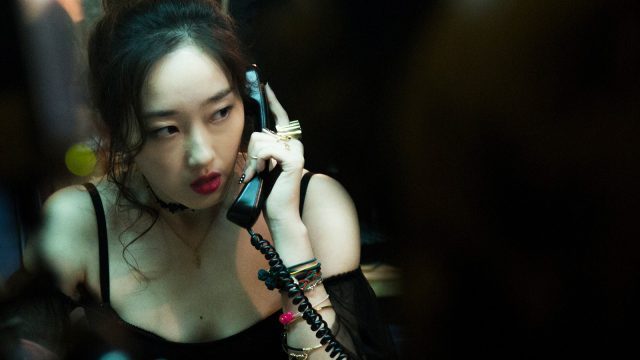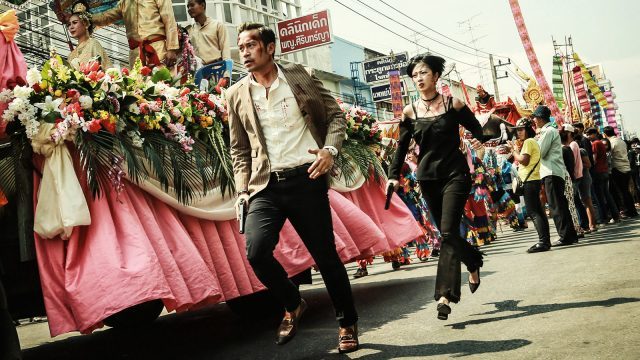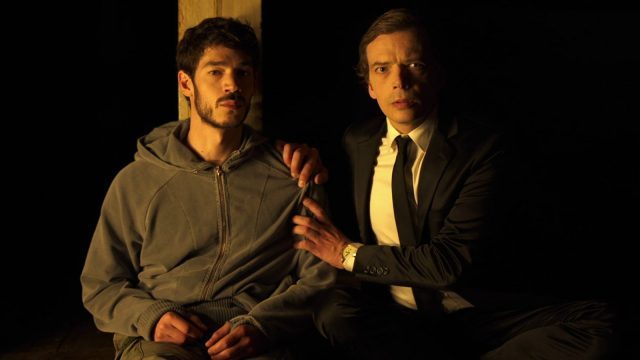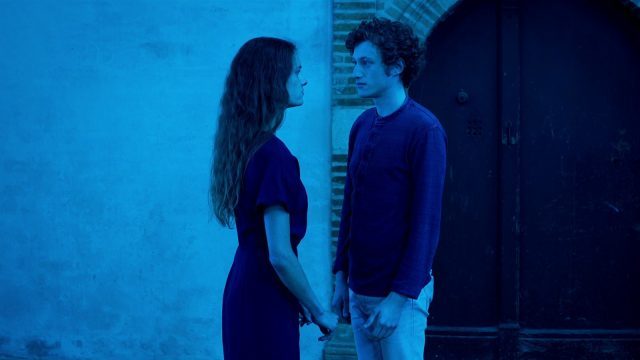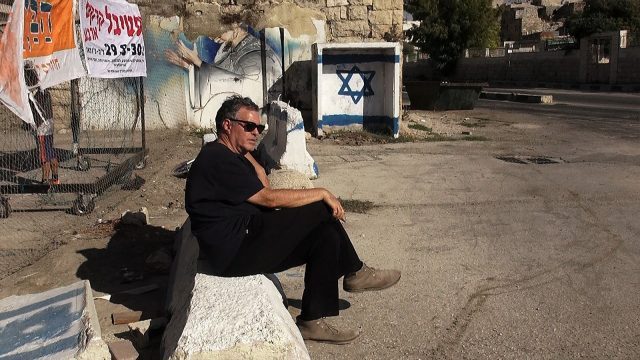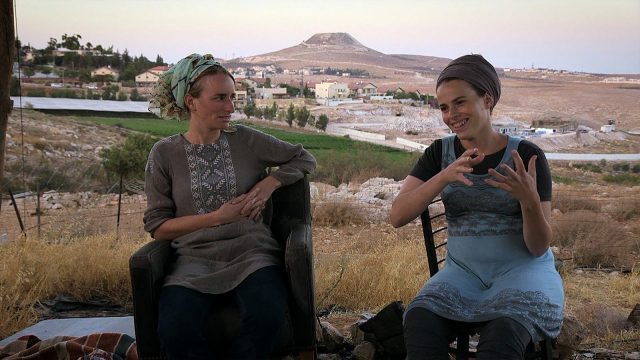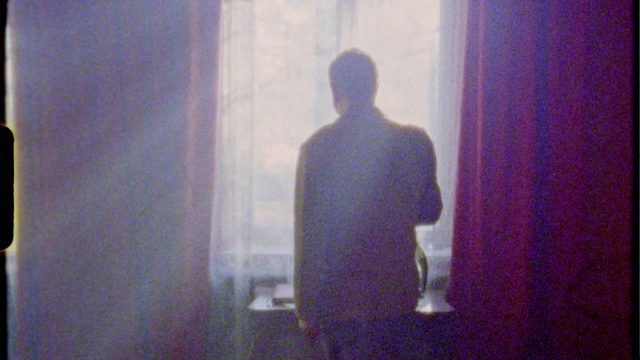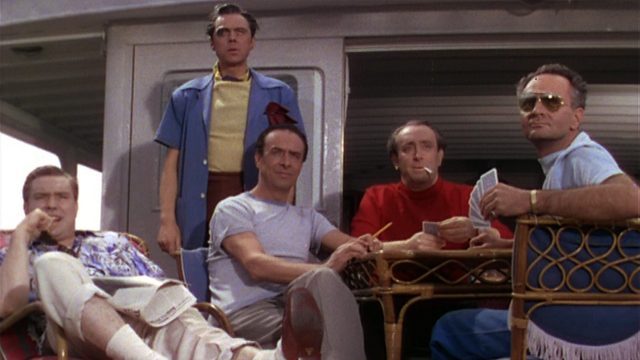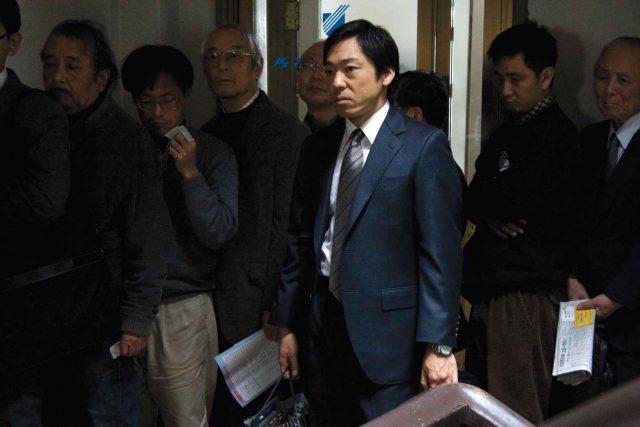
Ryuhei Sasaki (Teruyuki Kagawa) has trouble facing his sudden unemployment in Kiyoshi Kurosawa’s Tokyo Sonata
TOKYO SONATA (Kiyoshi Kurosawa, 2008)
Walter Reade Theater, Film Society of Lincoln Center
165 West 65th St. between Broadway & Amsterdam Aves.
Tuesday, August 7, 6:45
Festival runs through August 9
212-875-5050
www.filmlinc.org
 Winner of the Un Certain Regard Jury Prize at Cannes, Tokyo Sonata serves as a parable for modern-day Japan. Ryuhei Sasaki (Teruyuki Kagawa) is a simple family man, with a wife, Megumi (Kyōko Koizumi), two sons, Takashi (Yu Koyanagi) and Kenji (Kai Inowaki), and an honest job as an administration director for a major company. When Ryuhei is suddenly let go — he is being replaced by much cheaper Chinese labor — he is so ashamed, he doesn’t tell his family. Instead, he puts on his suit every day and, briefcase in hand, walks out the door, but instead of going to work, he first waits on line at the unemployment agency, then at an outdoor food kitchen for a free lunch with the homeless — and other businessmen in the same boat as he is. Taking out his anger on his family, Ryuhei refuses to allow Kenji to take piano lessons and protests strongly against Takashi’s desire to join the American military. But then, on one crazy night — which includes a shopping mall, a haphazard thief (Koji Yakusho), a convertible, and some unexpected violence — it all comes to a head, leading to a brilliant finale that makes you forget all of the uneven missteps in the middle of the film, which is about a half hour too long anyway.
Winner of the Un Certain Regard Jury Prize at Cannes, Tokyo Sonata serves as a parable for modern-day Japan. Ryuhei Sasaki (Teruyuki Kagawa) is a simple family man, with a wife, Megumi (Kyōko Koizumi), two sons, Takashi (Yu Koyanagi) and Kenji (Kai Inowaki), and an honest job as an administration director for a major company. When Ryuhei is suddenly let go — he is being replaced by much cheaper Chinese labor — he is so ashamed, he doesn’t tell his family. Instead, he puts on his suit every day and, briefcase in hand, walks out the door, but instead of going to work, he first waits on line at the unemployment agency, then at an outdoor food kitchen for a free lunch with the homeless — and other businessmen in the same boat as he is. Taking out his anger on his family, Ryuhei refuses to allow Kenji to take piano lessons and protests strongly against Takashi’s desire to join the American military. But then, on one crazy night — which includes a shopping mall, a haphazard thief (Koji Yakusho), a convertible, and some unexpected violence — it all comes to a head, leading to a brilliant finale that makes you forget all of the uneven missteps in the middle of the film, which is about a half hour too long anyway.
Kagawa (Sukiyaki Western Django, Tokyo!), is outstanding as the sad-sack husband and father, matched note for note by the wonderful pop star Koizumi (Hanging Garden, Adrift in Tokyo), who searches for strength as everything around her is falling apart. And it’s always great to see Yakusho, the star of such films as Kurosawa’s Cure, Shohei Imamura’s The Eel, Rob Marshall’s Memoirs of a Geisha, and Alejandro González Iñárritu’s Babel, seen here as a wild-haired, wild-eyed wannabe burglar. Tokyo Sonata, which is warmly photographed by Akiko Ashizawa, is screening August 7 at 6:45 in the Film Society of Lincoln Center series “The Female Gaze,” consisting of nearly three dozen films shot by women, investigating whether they bring something different to cinematic storytelling than men do. The series continues through August 9 with such other works as Céline Sciamma’s Tomboy, photographed by Crystel Fournier; Wim Wenders’s Pina in 3D, photographed by Hélène Louvart; Babette Mangolte’s The Camera: Je or La Camera: I, photographed by Mangolte; and Jacques Rivette’s Around a Small Mountain, photographed by Irina Lubtchansky.
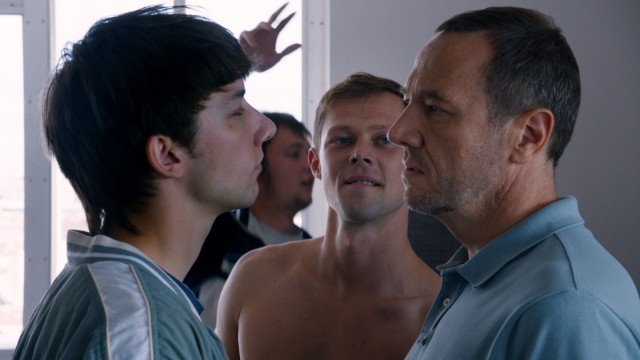
 Robin Campillo takes a genuinely compassionate look at immigration, home invasion, and sexual obsession in the compelling, always surprising Eastern Boys. Seeking out companionship, middle-aged Daniel (Olivier Rabourdin) spots young Marek (Kirill Emelyanov) and cruises him at the Gare du Nord station in Paris. They set up a paid rendezvous at Daniel’s apartment for the next day, but Marek’s arrival is preceded by that of his primarily male friends from Eastern Europe, illegal immigrants who begin taking things from Daniel’s place as they dance and drink; it’s a heartbreaking party scene, with Daniel not knowing how to react, an implicit if not overt threat to his physical well-being hovering over the thick atmosphere. But when Marek eventually does show up, Daniel is desperate for his attention, still determined to be alone with him, an attraction that has dangerous consequences.
Robin Campillo takes a genuinely compassionate look at immigration, home invasion, and sexual obsession in the compelling, always surprising Eastern Boys. Seeking out companionship, middle-aged Daniel (Olivier Rabourdin) spots young Marek (Kirill Emelyanov) and cruises him at the Gare du Nord station in Paris. They set up a paid rendezvous at Daniel’s apartment for the next day, but Marek’s arrival is preceded by that of his primarily male friends from Eastern Europe, illegal immigrants who begin taking things from Daniel’s place as they dance and drink; it’s a heartbreaking party scene, with Daniel not knowing how to react, an implicit if not overt threat to his physical well-being hovering over the thick atmosphere. But when Marek eventually does show up, Daniel is desperate for his attention, still determined to be alone with him, an attraction that has dangerous consequences.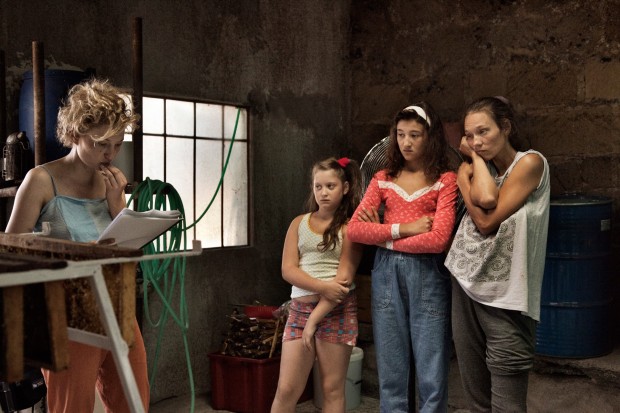
 Winner of the Grand Prix at the Cannes Film Festival, Alice Rohrwacher’s The Wonders is a sweet little gem of a movie, focusing on a German-Italian family that finds itself at a critical crossroads. Set in Rohrwacher’s (Corpo celeste) hometown in the countryside between Umbria-Lazio and Tuscany, the film follows the travails of a beekeeping family led by the gangly Wolfgang (Sam Louwyck), a grumpy ne’er-do-well from one of the Germanic countries who is trying to live some kind of back-to-the-land life away from authorities in an undeveloped backwater. His allegiance to old-fashioned tradition includes overworking his four young daughters while his wife, Angelica (Alba Rohrwacher, the director’s older sister), keeps at a distance and live-in friend Cocò (Sabine Timoteo) keeps stirring up the pot. At the center of it all is twelve-year-old Gelsomina (first-time actress Maria Alexandra Lungu, who was discovered in a catechism class), an exceptional beekeeper who wants her father to allow the family to participate in a television contest, Countryside Wonders, that could earn them much-needed money. But her father prefers taking care of things himself — though not very well, particularly when he acquires a camel for no apparent reason. Suspicious of the government and contemporary society, Wolfgang likes living in relative isolation; inviting strangers into their world could reveal the illegal working conditions, not to mention abuse of child labor laws. However, Gelsomina is determined to improve their existence, starting with the competition, which is hosted by the beguiling, fairy-tale-like Milly Catena (Monica Bellucci in a marvelous white head piece, partially poking fun at her own sex-symbol image).
Winner of the Grand Prix at the Cannes Film Festival, Alice Rohrwacher’s The Wonders is a sweet little gem of a movie, focusing on a German-Italian family that finds itself at a critical crossroads. Set in Rohrwacher’s (Corpo celeste) hometown in the countryside between Umbria-Lazio and Tuscany, the film follows the travails of a beekeeping family led by the gangly Wolfgang (Sam Louwyck), a grumpy ne’er-do-well from one of the Germanic countries who is trying to live some kind of back-to-the-land life away from authorities in an undeveloped backwater. His allegiance to old-fashioned tradition includes overworking his four young daughters while his wife, Angelica (Alba Rohrwacher, the director’s older sister), keeps at a distance and live-in friend Cocò (Sabine Timoteo) keeps stirring up the pot. At the center of it all is twelve-year-old Gelsomina (first-time actress Maria Alexandra Lungu, who was discovered in a catechism class), an exceptional beekeeper who wants her father to allow the family to participate in a television contest, Countryside Wonders, that could earn them much-needed money. But her father prefers taking care of things himself — though not very well, particularly when he acquires a camel for no apparent reason. Suspicious of the government and contemporary society, Wolfgang likes living in relative isolation; inviting strangers into their world could reveal the illegal working conditions, not to mention abuse of child labor laws. However, Gelsomina is determined to improve their existence, starting with the competition, which is hosted by the beguiling, fairy-tale-like Milly Catena (Monica Bellucci in a marvelous white head piece, partially poking fun at her own sex-symbol image). 